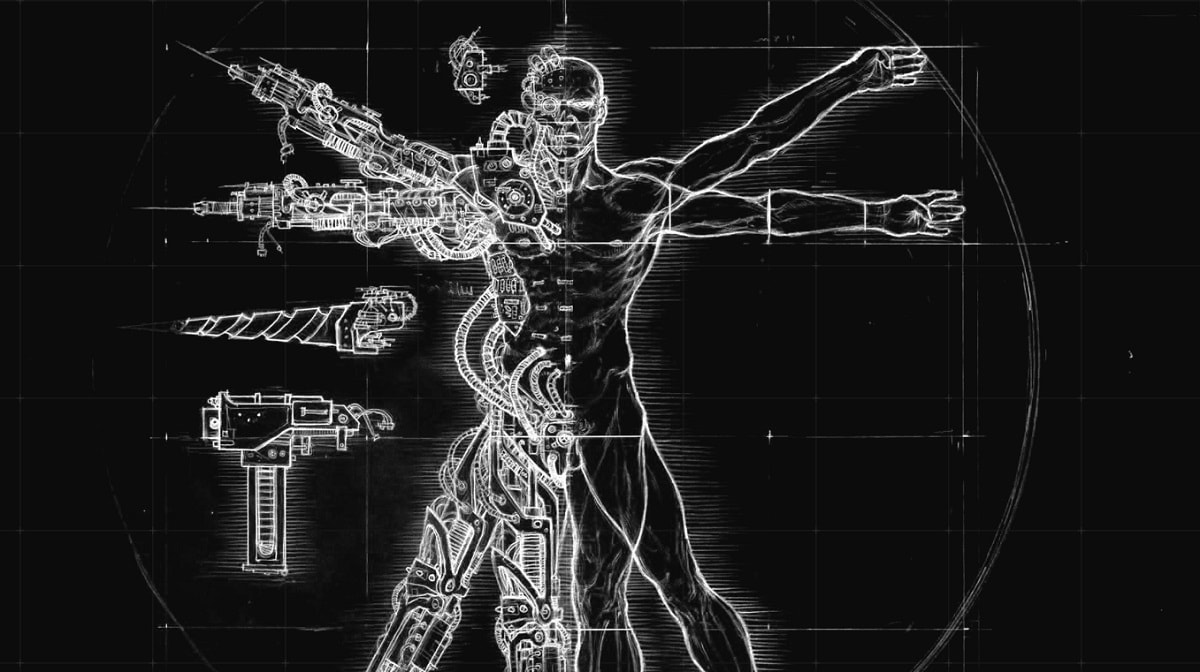There are three political trends that are emerging in the society to come and are already starting to clash a little bit. They are the pro-technology liberals, the pro-ecology conservatives and the pro-ecology egalitarians, the eternal struggle between freedom, order and equality.
Human freedom will be conquered by technology, according to liberal transhumanists
Modernity has certain virtues, but like any principle, when it is not rebalanced by its opposite, it sinks into excess. Thus, hypermodernity, in particular, generates the will to exercise its freedom and knowledge without limit, up to the technological developments of the transhumanists, the geoengineering, cyborg man.
READ IN UP' : Could technologies be used to regulate climate change?
For example, Paul J. CrutzenThe 1995 Nobel Laureate in Chemistry, "advocated a horse's remedy to cool the planet in case mankind proves unable to control its greenhouse gas emissions".[1]. He proposed injecting sulphur into the atmosphere, i.e. "tons of tiny sulphate aerosols. These aerosols increase the Earth's albedo, the proportion of the sun's energy that is directly reflected back into space from the stratosphere, without being able to heat the lower atmosphere or the ground. However, according to the magazine Science, three specialists in atmospheric chemistry, this geo-engineering would have another negative consequence: it would destroy the stratospheric ozone layer, which is essential for the protection of animals and plants from the Sun's aggressive ultraviolet rays.[2]. "According to the World Health Organization, sulphate aerosols are responsible for an estimated 500,000 premature deaths worldwide, mostly due to urban pollution. Forest scientists are no happier: Sulphur and acid rain have long been known to cause forest problems, although they are not the only cause of forest problems.[3].
Geo-engineering has other very costly and risky projects of the same type: Roger Angel, an American astronomer of British origin, for example, proposed in 2006 to send 1,600 billion small craft into orbit, all equipped with a mirror, to reflect 1% of solar radiation. In October 2013, an American company "dumped 100 tonnes of iron sulphate into the Pacific Ocean, conducting the largest - and most controversial - experiment ever recorded in this field. The objective: to fertilize the ocean, or rather to stimulate plankton with iron particles, with the promise of "capturing carbon absorbed by the plankton".[4].
There is also the project to "capture CO2 and inject it into the deep layers of the soil (...). The problem: carbon dioxide has to be stored for a long period of time. And if the "reservoir" fractures, the carbon dioxide can be released into the atmosphere. ».
Why not enjoy unlimited reading of UP'? Subscribe from €1.90 per week.
READ IN UP' : They're crazy! Scientists have a plan to stop climate change: dim the sun.
Seeking solutions to the climate problem in technology therefore leads to healing evil with evil. This sometimes works; however, it is very risky, like that of the sorcerer's apprentice... This is why the use, the excess of freedom to use one's reason, the freedom to create objects that are dangerous biologically (biotechnology, GMOs, DNA transformation...), chemically (pesticides, fertilizers), physically (nuclear, nanotechnology...) must be rebalanced through the promotion of opposing principles, such as that of collective order and equality. That is to say, the possibility of deciding collectively and democratically on the legitimacy of technological creations that potentially endanger the sustainability of humanity. The principle of harmonization of conflicts makes it possible to find a dynamic and therefore balanced dialectic between the triangle of freedom, order and equality.
In parallel with the increasing democratisation of science and the technology industry, some environmental movements are seeking to limit the use of technology. The most radical wish to return to the pre-industrial era. For example, by limiting the use of the wooden cart, as the Quaker communities in the United States do. The anarcho-primitivists go even further by advocating a return to the Paleolithic way of life of hunter-gatherers! But very few put their words into action in the long term. Between total rejection of technology and hyper-technology, more moderate practices, closer to the golden mean, aim to slow down the use and the technological boom, to limit dependence on electronics, computers and NICTs (new information and communication technologies) and to develop appropriate and controlled technologies instead.
The natural order of ecology can be exercised against the freedom of reason.
Indeed, one of the risks of ecology consists in defending the traditional natural order against modernity (political freedom, freedom of ideas, reason, humanism...). The other risk of the natural order is religious. The latter generally proves to be conservative and traditionalist. The danger consists in considering that the natural order is that of natural laws and divine laws. Consequently, only clerics, theologians and, at their head, religious leaders, such as the Pope, are in a position to determine divine truth and human error, good or bad values, just or dangerous techniques for society, such as assisted procreation, genetic selection of embryos or the use of GMOs. Between the anti-rationalist religious order and the so-called scientific order of experts at the service of the interests of capitalist transnationals, there is a new balance to be found. It undoubtedly lies in the democratisation of science and religion, in addition to the separation of religions and the state.
As we can see, political ecology, like the various economic policies, is governed by three major opposing and complementary principles. The two central principles for ecology are those of order (natural, religious...) and freedom (of reason, science, politics...). The third principle is more secondary in ecology, that of equality.
The balance between order and freedom limits their excesses.
Indeed, both order and freedom can be constructive or destructive from the point of view of the collective interest. The protection of the environment presupposes respect for the cycles of nature, the laws of biology and ecosystems, and therefore for the natural order of living things. Similarly, the implementation of democracy presupposes the creation of democratic laws, and therefore of a collective order decided by all, a legitimate authority. However, the order can become authoritarian, tyrannical and then dictatorial, such as ecofascism. On the psychological level, the need for order, for power, can become a need for power, for domination for fear of being weak or become a neurotic need for obsessive order, for fear of not being in control, for lack of organization.
In the same way, the freedom of modernity allows political freedom, freedom of conscience (reason, science...), individual freedom, humanism... However, the excess of freedom engenders the freedom of the strongest of neoliberalism and anarcho-capitalism, the freedom of the scientist apprentice sorcerer. Such as the freedom of the transhumanists, who can turn human beings into man-machines, or the limitless technological freedom of geo-engineering, which, in order to regulate the climate, can generate even greater ecological disasters. The scientific freedom conferred by biotechnology makes it possible to modify the genome of plants, animals and humans with consequences that are at the very least very risky, such as "terminator" GMOs, and at the worst, to create hybrid humans, mutants, which can become deformed beings or individuals built to work like slaves.
Liberal transhumanism advocates social control of the working classes by a government of experts.
Laurent Alexandre is the author of "L'AI (l'intelligence artificielle), va-elle aussi tuer la démocratie? »,[5] nevertheless proving to be a strong supporter of the transhumanist, which mainly involves artificial intelligence. He is also a member of the think-tanks the Century and shareholder with 28 % of the capital of the newspaper "La Tribune".
In a conference on Transhumanism at Centrale Supélec, on January 16 and 17, 2019, it will address some of France's top engineering students. His analysis seems paradoxical: on the one hand, he claims to be pro-elitist, i.e. that due to the increasing complexity of the world to come, only the elites will be able to understand it, and therefore they will be the only ones who should be able to decide in our societies. Even if he does not say more, we can therefore consider that he is favourable to the promotion of a "geniocracy", a power of geniuses, an aristocracy, a power of the best, a technocracy, a power of technicians, or an "expertocracy", a power of experts.
But on the other hand, he asserts that the growing complexity of the technological and societal system will create greater and greater gaps between the best and the weakest, between the best paid and the least paid, i.e. the transhumanist nightmare of inequality described by the historian Harrari in his book Homo Deus.[6].
To fight against disinformation and to favour analyses that decipher the news, join the circle of UP' subscribers.
Against this danger, he asserts that it is necessary on the contrary to reduce this gap without "making fun of less gifted people", that it is not necessary to "leave out the less gifted", and that it is therefore necessary to create "a society of intellectual solidarity".
Therefore, on the one hand, he says he is pro-elitist, pro-government of the experts, against the government of the people, and on the other hand, he defends solidarity with them. He believes that government elitism is necessary, but on the other hand, that we must not leave the poorest too far behind, because this would generate gaps, which will create tensions and revolts that will be detrimental to everyone, and therefore to the smooth running of society.
This analysis is therefore different from an egalitarian democratic policy, such as direct democracy, like referendums, or the ICR. Nor does it defend its opposite, i.e. a pyramidal, vertical approach to undemocratic government by elites alone. Rather, it proposes a government by elites, which takes into account the problems of the most fragile, so that they do not stop the global evolution of the elite system, transhumanism, cognitive capitalism, the hypertechnology society.
But Alexandre Laurent does not really specify by what means: more education in general, more redistribution of wealth to allow more education for the poorest and least educated? This would be a matter for social policy, therefore left-wing policy. Indeed, the supporters of a conservative or economically liberal society propose for their part to develop eugenics, thanks to the eradication of genetically less intelligent children before their birth, and they consider that it is necessary at the very least not to economically support children from the poorest classes and the handicapped.
Alexandre Laurent reminds us that many, like the leader of the transhumanists, Elon Musk, also seek to boost the intelligence of the less intelligent through neuro-technologies and neurosciences.[7]. But Laurent Alexandre does not believe that this will happen before 2070 at least, so it will be much too long.
However, for liberal transhumanism, of which Alexandre Laurent is a fervent supporter, this will only happen if the less intelligent have the financial capacity to pay, or if it can be useful to the dominant, to train technicians or elite soldiers to protect and serve them.
Alexandre Laurent believes that technological progress, societal complexity, will increase the number of the weakest, the poorest. Consequently, this will lead to an amplification of the revolts of the working classes - the number of yellow jackets revolted - less educated and less paid, which is likely to increase, which will endanger the elites, if they do not manage to control them. This social pacification can be achieved through solidarity and/or control. However, it does not specify in which direction it is necessary to pacify the society, nor if it should be done by a policy of economic solidarity (therefore of the left), or by a eugenicist or a liberal transhumanist policy, by the augmented man, therefore of the right.
READ IN UP' : Transhumanism is a war machine against life...by Jean-Michel Besnier
Errors of technology
The technology has already caused thousands of cancers and newborns with deformed and monstrous organs, including those caused by Chernobyl's nuclear radioactivity, food irradiation, chemicals such as pesticides in the fields, synthetic hormones in meat, etc. Similarly, GMO biotechnology endangers the balance of ecosystems, plant species and the laws of nature. GMOs increase the rate of cancer in rats, as shown by Professor Séralini's research published in 2011, and then published again in 2014 in a major scientific journal, after being controversial.[8]. Therefore, the effects on humans are most likely not harmless.
In the context of transhumanist technology, only the richest can treat themselves with the latest technology. However, the man-machine alliance of transhumanism can lead to the distortion of humanity in its capacity for free will, its sensitivity, its feelings... Because it is indeed the capacity to feel that machines and metals lack. So these are some of the excesses of the reductionist vision of scientific and technical materialism, which lie at the pole of the freedom of reason.
For others, such as the proponents of postmodernist ecology, the solution lies in the search for a balance between the excesses of "hyper-freedom", hypermodernity, conservative order, traditionalist order and authoritarian order. It is therefore a question of defending and developing individual freedom, democratic freedom and scientific freedom while ensuring, through political, economic and scientific democracy, respect for natural cycles, the laws of living things and environmental ecosystems, i.e. the natural ecological order.
They therefore seek to promote freedom that respects the collective and natural order, and therefore also economic equality. The three principles of freedom, equality and order are both complementary and opposed, in a dynamic dialectic.
Ecological ideologies, even if they are logically interested in respecting the order of nature, can very well be articulated with most political currents. Even if some are a priori less close to ecology, in terms of values, such as political currents based primarily on freedom. This is the case of liberal capitalism or libertarian socialism, and even more so of the anarcho-capitalism of libertarians, which refuses not only the State, but even the federation unlike the majority of libertarians. Thus, libertarian ecosocialisms unite the values of ecology with those of democratic freedom and economic equality.

Author of the book " Etre humain en système capitaliste ", Edition Yves Michel, 2015
[1] P. J. Crutzen " Climatic Change "Volume 77, page 211 (August 2006) in Huet 2008.
[2] Simone Tilmes et al. "Science", 25 April 2008, in Huet 2008.
[3] Sylvestre Huet, " Le dilemme du géoingénieur ", LibérationApril 29, 2008.
[4] Philippe Vion Dury, " Les projets fou des géo-ingénieurs pour réparer le climat ", New observer, 19/07/2013.
[5] Laurent Alexandre, Jean-François Cope, " Will AI also kill democracy?" Edition JC Lattes, 2019.
[6] Yuval Noah Harari, "Homo Deus, a brief history of the future", Albin Michel, 2017.
[7] Vance Ashlee, "Elon Musk, Tesla, PayPal, SpaceX: the entrepreneur who will change the world", Paris, Eyrolles, 2016.
[8] Gilles-Eric Séralini (and all), "Republished study: long-term toxicity of a Roundup herbicide and a Roundup-tolerantgenetically modified maize"Environmental Sciences Europe Bridging Science and Regulation at the Regional and European Level, 2014 26:14, DOI: 10.1186/s12302-014-0014-5.













On GMOs and Seralini you can read Sylvestre Huet that you quoted earlier: https://www.lemonde.fr/blog/huet/2018/12/11/ogm-poisons-la-vraie-fin-de-laffaire-seralini/
On GMOs and Seralini you can read Sylvestre Huet that you quoted earlier: https://www.lemonde.fr/blog/huet/2018/12/11/ogm-poisons-la-vraie-fin-de-laffaire-seralini/